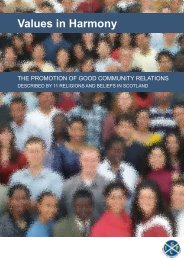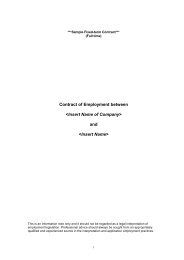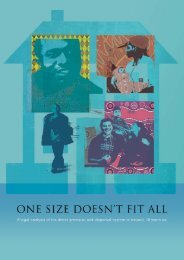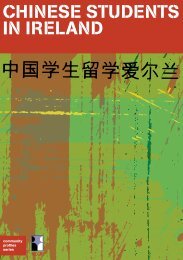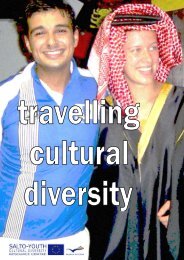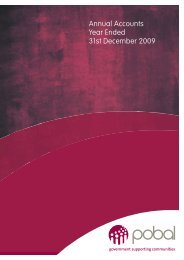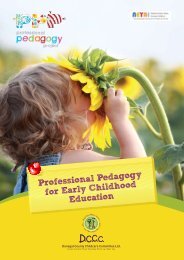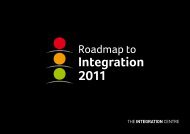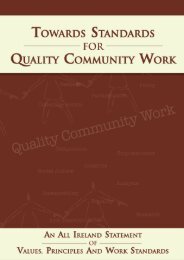Intercultural Education in the Post-Primary School - National Council ...
Intercultural Education in the Post-Primary School - National Council ...
Intercultural Education in the Post-Primary School - National Council ...
Create successful ePaper yourself
Turn your PDF publications into a flip-book with our unique Google optimized e-Paper software.
• <strong>in</strong>corporate performance contexts which<strong>in</strong>clude costume, movement, scenery, etc.• <strong>in</strong>vite local musicians from o<strong>the</strong>rtraditions and cultures to perform to <strong>the</strong>students• utilise talents with<strong>in</strong> <strong>the</strong> schoolcommunity of staff, students and parentsto present items from o<strong>the</strong>r cultures• identify and compare different types ofresponse to music performance• develop a sense of <strong>in</strong>tegrity and respectfor group decisions concern<strong>in</strong>g musicstyle and performance• encourage participative roles <strong>in</strong> groupactivities which demonstrate <strong>in</strong>itiativefor <strong>the</strong> good of <strong>the</strong> whole ensemble.2. To develop aural perception <strong>in</strong> itsbroadest sense and to foster anawareness and an appreciation of <strong>the</strong>music of <strong>the</strong> past and of <strong>the</strong> present,and of its role <strong>in</strong> our own as well aso<strong>the</strong>r environments.An <strong>in</strong>clusive music programme will• refer to background cultures <strong>in</strong> <strong>the</strong> studyof songs and works from o<strong>the</strong>r cultures(Set Songs and Set Works)• select pieces (Choice Songs and ChoiceWorks) which offer opportunities toencounter unfamiliar cultures andtraditions• discuss <strong>the</strong> significance of <strong>the</strong> role ofmusic <strong>in</strong> <strong>the</strong>se cultures• consider genres and styles whichhighlight diversity and difference whenselect<strong>in</strong>g topics for <strong>the</strong> general study• use video and live performance oftraditional Irish music to streng<strong>the</strong>n <strong>the</strong>understand<strong>in</strong>g of <strong>the</strong> relationshipbetween music and culture• explore differences and similaritiesbetween examples of music fromdifferent parts of Ireland and differentparts of Europe and <strong>the</strong> world• observe <strong>the</strong> different roles music cantake <strong>in</strong> ceremony and social function,with<strong>in</strong> Ireland and beyond• identify and <strong>in</strong>vestigate characteristics ofmusic associated with particularcontexts, purposes and styles <strong>in</strong> past andpresent cultures• explore music as an expression ofstruggle and hope, deal<strong>in</strong>g with <strong>the</strong>mesof conflict and peace, of liberation anddiscrim<strong>in</strong>ation.3. To provide sufficient musical experienceand factual <strong>in</strong>formation to enable <strong>the</strong>students to develop and practiselisten<strong>in</strong>g and compos<strong>in</strong>g skills withgreater understand<strong>in</strong>g and <strong>in</strong>terest, andto support perform<strong>in</strong>g skills with amore <strong>in</strong>formed awareness of <strong>the</strong> relatedand necessary underly<strong>in</strong>g facts.An <strong>in</strong>clusive Music programme will• expose students to a variety of notationsystems (tonic solfa, number<strong>in</strong>g, nonwestern,tablature, graphic, etc.)• <strong>in</strong>vestigate <strong>the</strong> dom<strong>in</strong>ance of <strong>the</strong> westernmajor/m<strong>in</strong>or tonality• explore <strong>the</strong> growth of popular music,<strong>the</strong> effect of technology of music styles,<strong>the</strong> <strong>in</strong>fluence of <strong>the</strong> guitar with itstonic/dom<strong>in</strong>ant tun<strong>in</strong>g• <strong>in</strong>volve students <strong>in</strong> collaborativecompositional activities that demandrespect for <strong>the</strong> contributions of o<strong>the</strong>rs.A detailed audit of <strong>the</strong> opportunities for<strong>in</strong>clud<strong>in</strong>g <strong>in</strong>tercultural <strong>the</strong>mes <strong>in</strong> Music aswell as sample lessons can be found on <strong>the</strong>CD-ROM and at www.ncca.ie.Physical <strong>Education</strong>Amongst <strong>the</strong> aims of <strong>the</strong> Junior CertificatePhysical <strong>Education</strong> syllabus is ‘to promotepositive attitudes towards participation <strong>in</strong>physical activity and towards co-operation72<strong>Intercultural</strong> <strong>Education</strong> <strong>in</strong> <strong>the</strong> <strong>Post</strong>-<strong>Primary</strong> <strong>School</strong>




